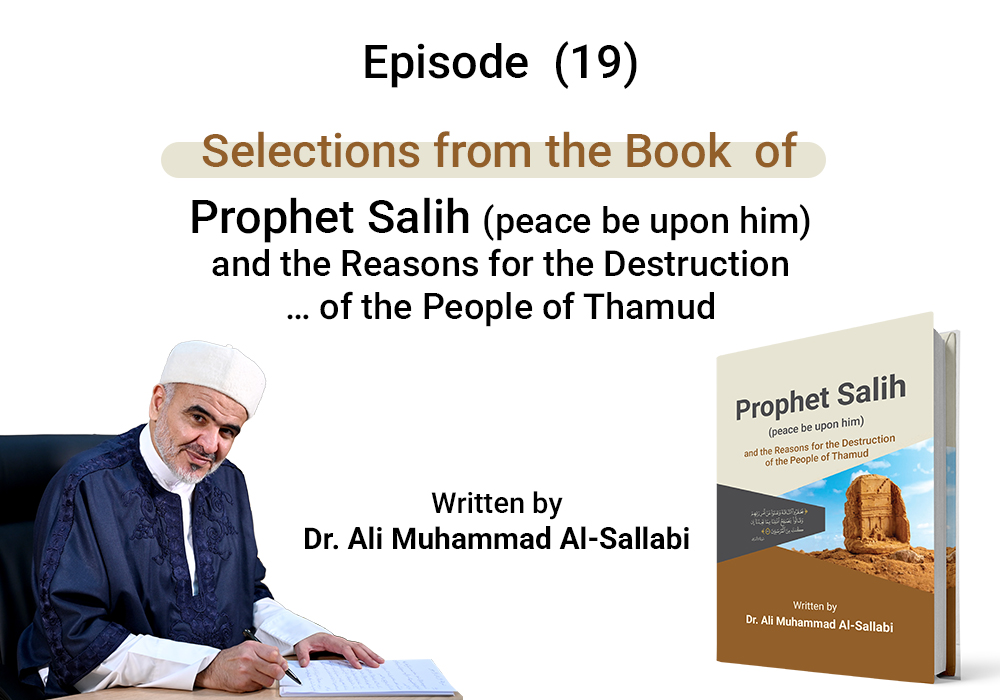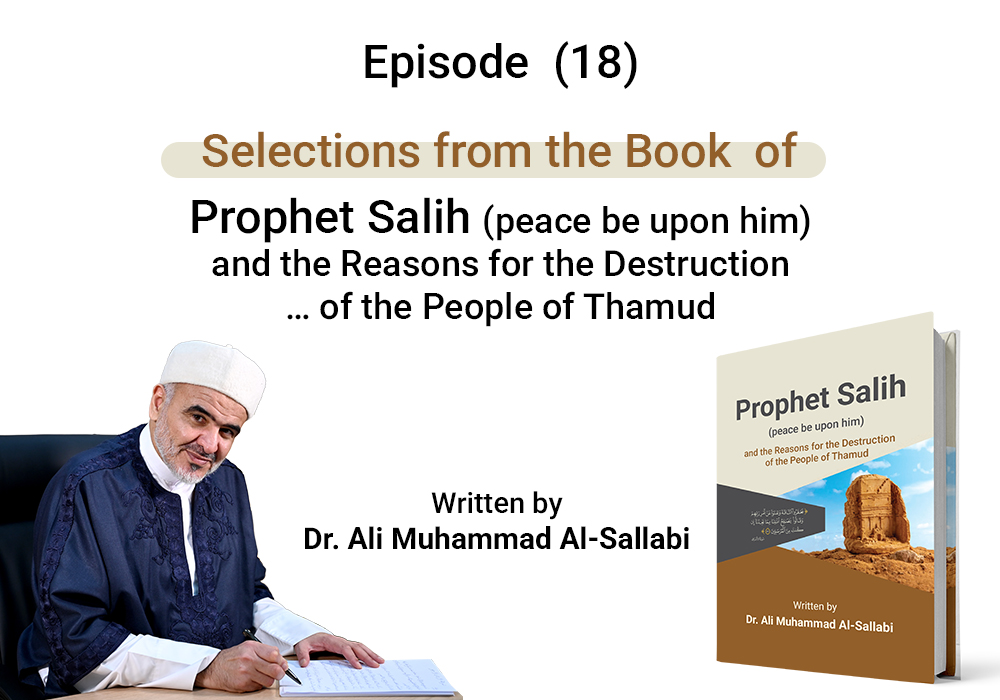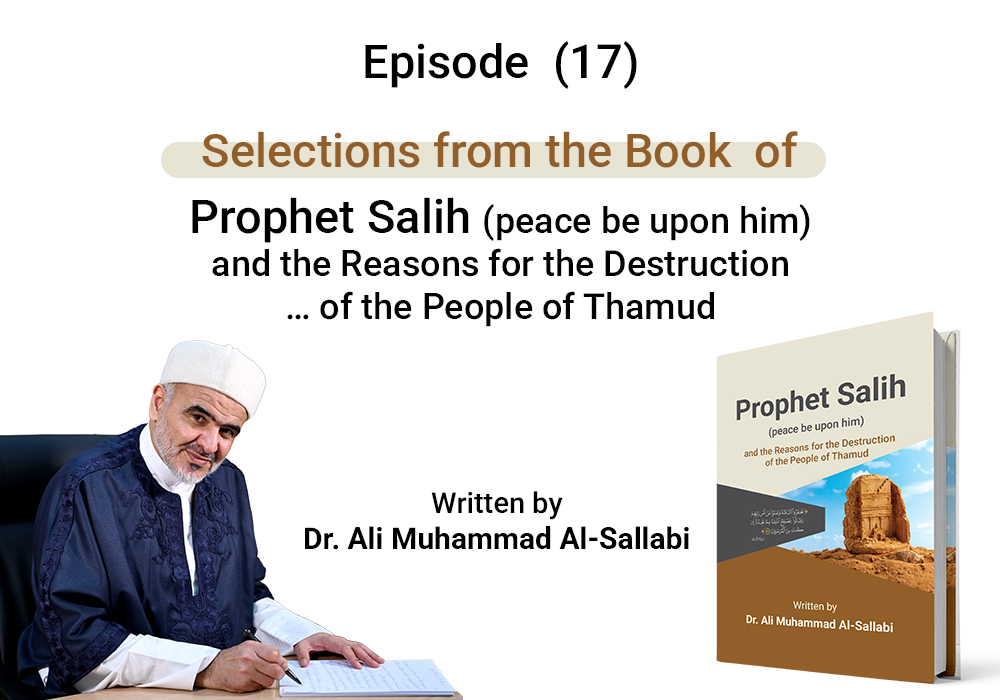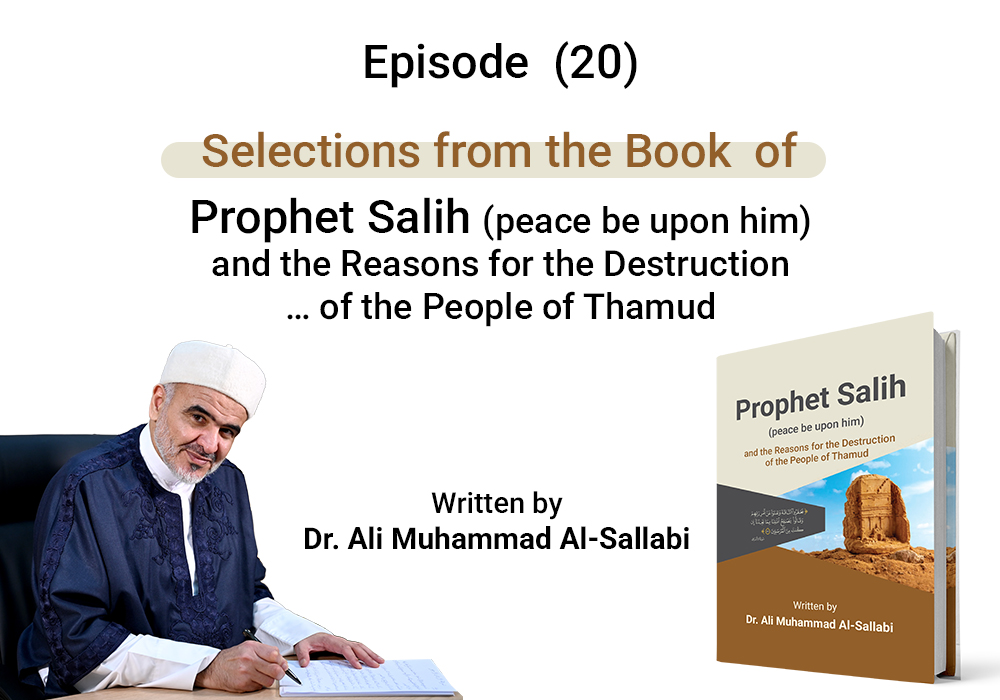The Reasons for the Destruction of the People of Thamud;
Corruption
Selections from the Book Prophet Salih (peace be upon him) and the Reasons for the Destruction of the People of Thamud …
Written by Dr. Ali Muhammad al-Sallabi...
Episode (19)
The people of Thamud were described by Allah as corrupt in the context of mentioning the people of ‘Aad and Pharaoh. Allah Almighty said: {Have you not considered how your Lord dealt with ʿAad – (6) [With] Iram - who had lofty pillars, (7) The likes of whom had never been created in the land? (8) And [with] Thamud, who carved out the rocks in the valley? (9) And [with] Pharaoh, owner of the stakes? (10) [All of] whom oppressed within the lands (11) And increased therein the corruption. (12) So your Lord poured upon them a scourge of punishment. (13) Indeed, your Lord is in observation. (14)} [Al-Fajr: 6-14].
Allah mentioned: {[All of] whom oppressed within the lands (11) And increased therein the corruption. (12)}. These are the nations that were notorious for corruption in their beliefs, morals, social practices, political systems, and religion. This corruption was represented in the elites and the general population, although the leadership, which led these nations into corruption, was primarily responsible. Allah’s Sunnah of punishment was then carried out upon them.
Corruption on earth only occurs due to the actions and behaviors of humans upon it. Calamities and hardships come as a result of these corruptions. No matter how different nations are in time, place, or environment, they share several common traits.
Corrupt nations exhibit certain characteristics: cruelty that shows no pity for the weak, ingratitude that ignores admonishment, focus on worldly life with no concern for the hereafter, forgetfulness of Allah and disregard for His rights. The persistence of such nations in their state of corruption becomes a trial for the world, for civilization, and for high ideals. When the blows of fate strike them, it is like the execution of a criminal when the death penalty is carried out.
The story of Salih (peace be upon him) in the Holy Quran reveals the aspects of corruption in his people, including:
- Their lack of piety toward Allah and disobedience to the teachings of Prophet Salih (peace be upon him).
- Their submission to the practices of the wealthy and extravagant, imitating their way of life.
- The people of Thamud’s neglect of the lessons from previous nations and their failure to learn from them.
- Their exceeding the acceptable limit in their corruption: {and do not commit abuse on the earth, spreading corruption.}. They were warned not to persist in corruption as they were already deeply involved in it.
Thamud committed various forms of corruption—doctrinal, ethical, social, and devotional. Corruption had penetrated the elite, and the general public followed their lead. Consequently, Allah’s punishment descended upon them, and their material civilization, which was far removed from the monotheism of Allah, collapsed, along with the ethical and spiritual values that were meant to guide them.
- Ali Muhammad al-Sallabi, Prophet Salih (peace be upon him) and the Reasons for the Destruction of the People of Thamud, pp. 343-345.
- Stories of the Quran, a Quranic reading, Amr Al-Shaer, p. 144.
- Corruption on Earth and Islam’s Position on It, Osama Kabbara, Dar Al Nahda Al Arabiya, 2009, p. 83.
- Views on the Quran, Muhammad al-Ghazali, Nahdet Misr, 2005, p. 89.
- Civilizational Exchange in the Quran, p. 134.
For further information and review of the sources for the article, see:
The Book of Prophet Salih (peace be upon him) and the Reasons for the Destruction of the People of Thamud on the official website of Sheikh Dr. Ali Muhammad al-Sallabi:
The Reasons for the Destruction of the People of Thamud;
Corruption
Selections from the Book Prophet Salih (peace be upon him) and the Reasons for the Destruction of the People of Thamud …
Written by Dr. Ali Muhammad al-Sallabi...
Episode (19)
The people of Thamud were described by Allah as corrupt in the context of mentioning the people of ‘Aad and Pharaoh. Allah Almighty said: {Have you not considered how your Lord dealt with ʿAad – (6) [With] Iram - who had lofty pillars, (7) The likes of whom had never been created in the land? (8) And [with] Thamud, who carved out the rocks in the valley? (9) And [with] Pharaoh, owner of the stakes? (10) [All of] whom oppressed within the lands (11) And increased therein the corruption. (12) So your Lord poured upon them a scourge of punishment. (13) Indeed, your Lord is in observation. (14)} [Al-Fajr: 6-14].
Allah mentioned: {[All of] whom oppressed within the lands (11) And increased therein the corruption. (12)}. These are the nations that were notorious for corruption in their beliefs, morals, social practices, political systems, and religion. This corruption was represented in the elites and the general population, although the leadership, which led these nations into corruption, was primarily responsible. Allah’s Sunnah of punishment was then carried out upon them.
Corruption on earth only occurs due to the actions and behaviors of humans upon it. Calamities and hardships come as a result of these corruptions. No matter how different nations are in time, place, or environment, they share several common traits.
Corrupt nations exhibit certain characteristics: cruelty that shows no pity for the weak, ingratitude that ignores admonishment, focus on worldly life with no concern for the hereafter, forgetfulness of Allah and disregard for His rights. The persistence of such nations in their state of corruption becomes a trial for the world, for civilization, and for high ideals. When the blows of fate strike them, it is like the execution of a criminal when the death penalty is carried out.
The story of Salih (peace be upon him) in the Holy Quran reveals the aspects of corruption in his people, including:
- Their lack of piety toward Allah and disobedience to the teachings of Prophet Salih (peace be upon him).
- Their submission to the practices of the wealthy and extravagant, imitating their way of life.
- The people of Thamud’s neglect of the lessons from previous nations and their failure to learn from them.
- Their exceeding the acceptable limit in their corruption: {and do not commit abuse on the earth, spreading corruption.}. They were warned not to persist in corruption as they were already deeply involved in it.
Thamud committed various forms of corruption—doctrinal, ethical, social, and devotional. Corruption had penetrated the elite, and the general public followed their lead. Consequently, Allah’s punishment descended upon them, and their material civilization, which was far removed from the monotheism of Allah, collapsed, along with the ethical and spiritual values that were meant to guide them.
- Ali Muhammad al-Sallabi, Prophet Salih (peace be upon him) and the Reasons for the Destruction of the People of Thamud, pp. 343-345.
- Stories of the Quran, a Quranic reading, Amr Al-Shaer, p. 144.
- Corruption on Earth and Islam’s Position on It, Osama Kabbara, Dar Al Nahda Al Arabiya, 2009, p. 83.
- Views on the Quran, Muhammad al-Ghazali, Nahdet Misr, 2005, p. 89.
- Civilizational Exchange in the Quran, p. 134.
For further information and review of the sources for the article, see:
The Book of Prophet Salih (peace be upon him) and the Reasons for the Destruction of the People of Thamud on the official website of Sheikh Dr. Ali Muhammad al-Sallabi:






